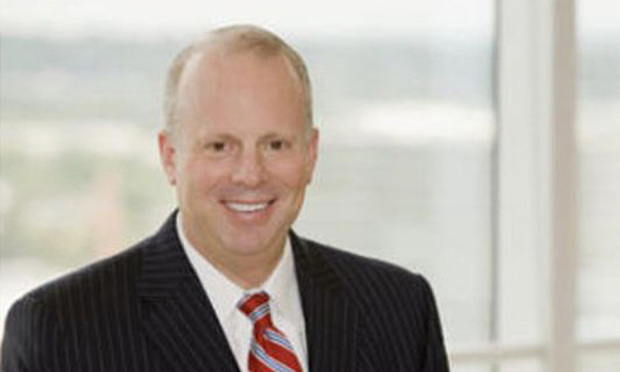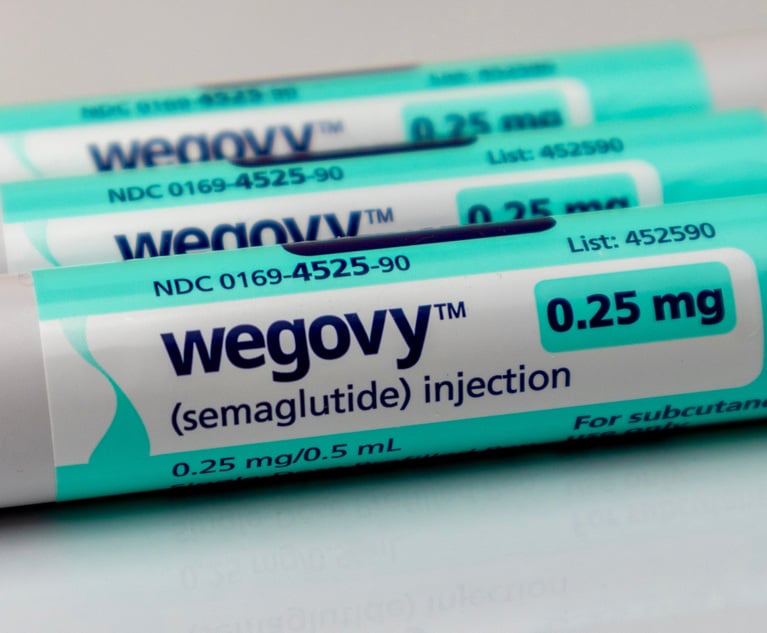Portion of Ex-Director's Claims Against Company Founder Avoids Laches Dismissal
A Delaware Chancery Court judge Thursday allowed the former director of a Delaware health information company to pursue claims that the firm's founder had cheated him out of stock options he was promised for joining the board in 2005.
April 25, 2019 at 05:05 PM
4 minute read
 Vice Chancellor Joseph Slights.
Vice Chancellor Joseph Slights.
A Delaware Chancery Court judge Thursday allowed the former director of a Delaware health information company to pursue claims that the firm's founder had cheated him out of stock options he was promised for joining the board in 2005.
Vice Chancellor Joseph R. Slights III, however, dismissed a slate of other claims against CentriHealth Inc. and its board for an unreasonable delay, in a ruling that explored the boundaries of the equitable doctrine of laches.
While laches had barred some of plaintiff Richard Forman's claims, Slights found that the April 2018 complaint had established an initial case against CentriHealth founder and chairman Ralph Korpman for allegedly concealing from Forman that his stock options under a 2006 plan were no longer valid following Forman's resignation from the board.
According to the complaint, Korpman had promised Forman that his options would not terminate after he quit as a director in 2010, citing a “lack of corporate governance at the company.” It wasn't until 2017, Forman claimed, that the company told him in a letter from its lawyer that his options had actually expired seven years earlier.
In a 41-page memorandum opinion, Slights said that as CentriHealth's chairman and controlling stockholder, Korpman owed Forman a fiduciary duty to “act with honesty,” and credited assertions that that the founder's alleged lies had led Forman to believe that he was in no danger of forfeiting his rights at the time of his departure.
“Forman has well-pled that Korpman failed to fulfill that duty,” Slights wrote. “Whether and to what extent Forman's failure to inform himself of the terms of the CentriHealth stock option plan, either as a beneficiary of that plan or as a director who voted to approve the plan, will affect the viability of his claims, as a matter of laches or on the merits, are questions that must await further discovery to decide.”
But Forman did not fare as well with regard to claims that he had been swindled out of so-called “founder's shares,” which equated to a 1-percent stake in the firm, which was bought by UnitedHealth Group Inc. in 2017.
According to the opinion, a “pattern” emerged over the course of 11 years, where Forman would ask for confirmation that he owned the founder's shares, but Korpman would either avoid the question entirely or provide materials that were not responsive to the request. Sometimes, Slights said, Forman would wait years to repeat his inquiry, only to receive the same answer.
According to Slights, it should have been apparent to Forman no later than 2013 that the company had no intention of acknowledging his shares, making his claims “markedly untimely.”
“Forman knew well that the company had not acknowledged his claimed ownership of Founder's Shares; and yet he did nothing press his claim,” Slights said.
“Whether viewed as asserting a claim with unreasonable delay through the lens of the analogous statute of limitations or, more fundamentally, as a failure to act with vigilance when seeking equity, Forman's inexplicable delay in bringing his claims regarding the founder's shares cannot be countenanced.”
An attorney for Forman did not return a call seeking comment on the ruling, and counsel for Korpman and CentriHealth was not immediately available to comment.
Forman is represented by Michael A. Weidinger and Joanne P. Pinckney of Pinckney, Weidinger, Urban & Joyce in Wilmington.
The defendants are represented by Bruce C. Doeg, John S. Hicks and Christopher E. Thorsen of Baker, Donelson, Bearman, Caldwell & Berkowitz in Nashville, Tennessee.
The case is captioned Forman v. CentrifyHealth.
This content has been archived. It is available through our partners, LexisNexis® and Bloomberg Law.
To view this content, please continue to their sites.
Not a Lexis Subscriber?
Subscribe Now
Not a Bloomberg Law Subscriber?
Subscribe Now
NOT FOR REPRINT
© 2025 ALM Global, LLC, All Rights Reserved. Request academic re-use from www.copyright.com. All other uses, submit a request to [email protected]. For more information visit Asset & Logo Licensing.
You Might Like
View All

Wilson Sonsini Knocks Out Claims Against Inhibrx Biosciences in Trade Secrets Verdict

'I Don't Want to Die Fearfully': Outsiders Can't Get Help to Die in NJ
4 minute read
Novo Nordisk Files Patent Claims to Fend off Generic Rivals of Wegovy
3 minute readTrending Stories
- 1Uber Files RICO Suit Against Plaintiff-Side Firms Alleging Fraudulent Injury Claims
- 2The Law Firm Disrupted: Scrutinizing the Elephant More Than the Mouse
- 3Inherent Diminished Value Damages Unavailable to 3rd-Party Claimants, Court Says
- 4Pa. Defense Firm Sued by Client Over Ex-Eagles Player's $43.5M Med Mal Win
- 5Losses Mount at Morris Manning, but Departing Ex-Chair Stays Bullish About His Old Firm's Future
Who Got The Work
J. Brugh Lower of Gibbons has entered an appearance for industrial equipment supplier Devco Corporation in a pending trademark infringement lawsuit. The suit, accusing the defendant of selling knock-off Graco products, was filed Dec. 18 in New Jersey District Court by Rivkin Radler on behalf of Graco Inc. and Graco Minnesota. The case, assigned to U.S. District Judge Zahid N. Quraishi, is 3:24-cv-11294, Graco Inc. et al v. Devco Corporation.
Who Got The Work
Rebecca Maller-Stein and Kent A. Yalowitz of Arnold & Porter Kaye Scholer have entered their appearances for Hanaco Venture Capital and its executives, Lior Prosor and David Frankel, in a pending securities lawsuit. The action, filed on Dec. 24 in New York Southern District Court by Zell, Aron & Co. on behalf of Goldeneye Advisors, accuses the defendants of negligently and fraudulently managing the plaintiff's $1 million investment. The case, assigned to U.S. District Judge Vernon S. Broderick, is 1:24-cv-09918, Goldeneye Advisors, LLC v. Hanaco Venture Capital, Ltd. et al.
Who Got The Work
Attorneys from A&O Shearman has stepped in as defense counsel for Toronto-Dominion Bank and other defendants in a pending securities class action. The suit, filed Dec. 11 in New York Southern District Court by Bleichmar Fonti & Auld, accuses the defendants of concealing the bank's 'pervasive' deficiencies in regards to its compliance with the Bank Secrecy Act and the quality of its anti-money laundering controls. The case, assigned to U.S. District Judge Arun Subramanian, is 1:24-cv-09445, Gonzalez v. The Toronto-Dominion Bank et al.
Who Got The Work
Crown Castle International, a Pennsylvania company providing shared communications infrastructure, has turned to Luke D. Wolf of Gordon Rees Scully Mansukhani to fend off a pending breach-of-contract lawsuit. The court action, filed Nov. 25 in Michigan Eastern District Court by Hooper Hathaway PC on behalf of The Town Residences LLC, accuses Crown Castle of failing to transfer approximately $30,000 in utility payments from T-Mobile in breach of a roof-top lease and assignment agreement. The case, assigned to U.S. District Judge Susan K. Declercq, is 2:24-cv-13131, The Town Residences LLC v. T-Mobile US, Inc. et al.
Who Got The Work
Wilfred P. Coronato and Daniel M. Schwartz of McCarter & English have stepped in as defense counsel to Electrolux Home Products Inc. in a pending product liability lawsuit. The court action, filed Nov. 26 in New York Eastern District Court by Poulos Lopiccolo PC and Nagel Rice LLP on behalf of David Stern, alleges that the defendant's refrigerators’ drawers and shelving repeatedly break and fall apart within months after purchase. The case, assigned to U.S. District Judge Joan M. Azrack, is 2:24-cv-08204, Stern v. Electrolux Home Products, Inc.
Featured Firms
Law Offices of Gary Martin Hays & Associates, P.C.
(470) 294-1674
Law Offices of Mark E. Salomone
(857) 444-6468
Smith & Hassler
(713) 739-1250






